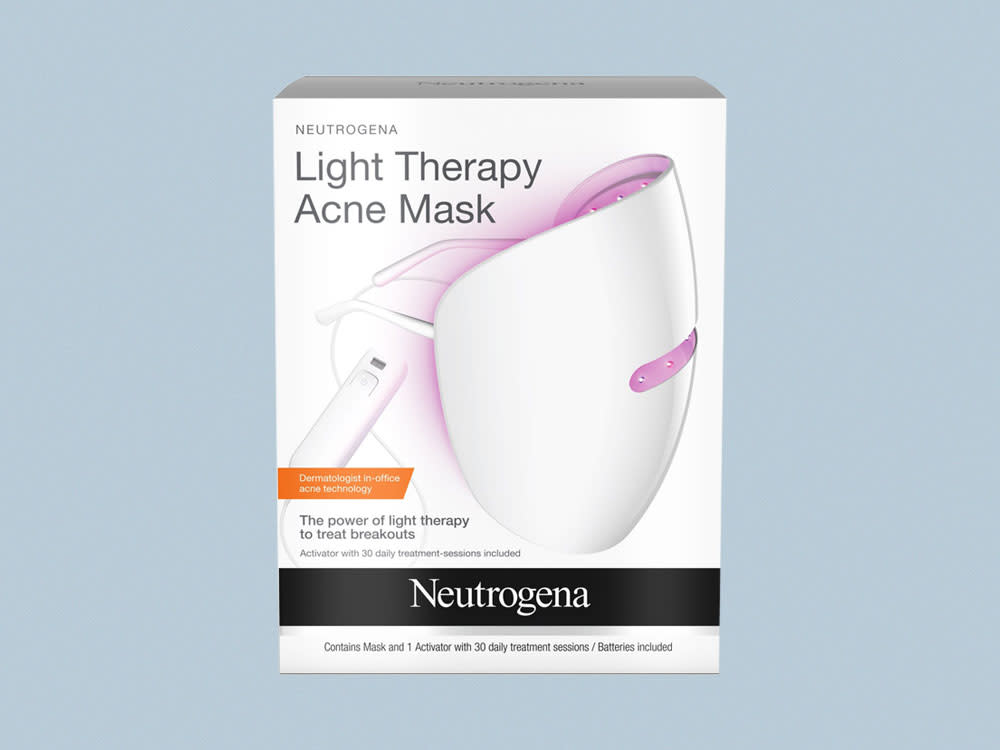Everything You Need to Know About the Neutrogena Light Therapy Mask Recall

The Neutrogena Home Light Therapy Mask seemed like a dream, promising to alleviate acne-causing bacteria and inflammation, all at the affordable price of $35. What could be better than a celebrity treatment at a *much* lower pricepoint, right?
We're not the only ones who thought this way: After its October 2016 launch, the mask flooded our Instagram feeds and was endorsed by actress Lena Dunham, celebrity aesthetician Shani Darden and many other bold-faced names. The product’s sales skyrocketed, and it quickly won a plethora of prestigious skin-care awards.
You May Also Like: This Common Acne Medication Almost Made One Woman Go Blind
Needless to say, many (us included!) were shocked when the Johnson & Johnson-owned brand issued a statement regarding a recall of the light therapy mask.
A post shared by Lena Dunham (@lenadunham) on Dec 28, 2016 at 12:44pm PST
On July 5, Neutrogena stated that the decision to recall the mask was “made out of an abundance of caution." The “theoretical risk of eye injury” would mostly affect those with an underlying eye condition or those who take medications that increase light sensitivity.
This statement was issued following “reports of mild and transient visual adverse events,” of which Neutrogena left out the specific details. Nonetheless, the representatives stated the masks are still safe to use for the general public, minus the group of those affected by eye conditions, so long as the consumer used it as instructed once a day.
News of the product recall did not reach consumers right away until the Australian Department of Health issued a consumer-level recall which provided everyone with more information about the dangers of the masks. The statement included that this exposure to blue light may cause “varying degrees of retinal damage that could be irreversible and could accelerate peripheral vision impairment or loss."
Additionally, that the mask may cause “eye pain, discomfort, irritation, tearing, blinding, blurring of vision, seeing spots/flashes and other changes in vision." The Department of Health advised all consumers to stay away from these light therapy masks. The FDA said the agency was notified of the recall and is currently looking into it.
A post shared by Pyzkita (@pyzkita) on Dec 15, 2018 at 10:39am PST
If you’re a fan of the mask, New York dermatologist Sapna Palep, MD says in-office treatments deliver even better results. “At-home LED devices use lower frequencies, so they haven’t proven to be as effective or the results as dramatic as in-office treatments,” she says. “When these devices are used at-home, there is potential for the light to damage the retina of the eye, so I do not recommend them for use at-home.” Her alternative treatment of choice, especially for combatting acne: Blu-U blue light technology, offered at her practice.
“The light is specifically calibrated to emit a blue light wavelength, which has been shown to have antibacterial effects on the specific microbe called ‘P acnes’ that causes acne,” adds New York dermatologist Rita Linkner, MD. “It can also be combined with a topical solution called amino levulanic acid, which when activated by this specific blue light, creates a photoreactive reaction in the skin which clears pre-cancerous lesions called actinic keratoses.”
"As patients often require multiple treatments and over-exposure to this light can be potentially dangerous to your vision, I recommend always visiting a board-certified dermatologist who is expertly trained to administer these types of treatments to ensure they are done safely for the health of your eyes and skin," says Dr. Linkner.

 Yahoo Movies
Yahoo Movies 

